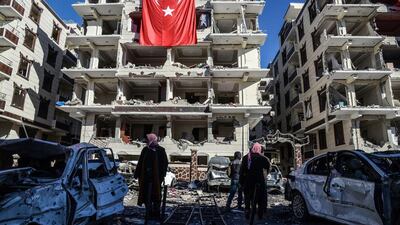A story in Al Hayat newspaper on February 18 highlighted the convoluted nature of foreign interventions in Syria. The article noted that the United States was studying three plans for the takeover of Raqqa from ISIL. One of those plans was presented by Turkey, which does not want to see the Kurdish-dominated Syrian Democratic Forces entering the city.
However, limiting Turkey’s intentions in Syria to blocking the emergence of a Kurdish entity is short-sighted. Ankara is also angling for a role in a post-war Syria. Surprisingly, it seems to have been assisted in this by Russia, which sponsored the Astana negotiations with Turkey and Iran, and has been helping the Turkish military advance against ISIL in Al Bab.
Russian openness to participation by Turkey in a post-war arrangement derives from a realistic reading of Bashar Al Assad’s weaknesses. The Syrian president, in a statement last week, vowed to regain control over “every inch” of Syrian territory. However, there are not enough Syrian ground forces to do such a thing, nor is Mr Al Assad, given his regime’s terrible crimes, in a position to lead post-war reconciliation.
In that context, then, the Russians may have seen an opening to bring in Turkey and Iran to help shape a post-war situation that could better stabilise Syria. One issue it has discussed with both sides is the creation of a military council alongside a government of national accord, which would gather together government and opposition military commanders.
The true role of such a council remains a matter of speculation. A report in Al Araby Al Jadeed in July 2016 suggested that the idea was also discussed by the United States and Russia. While Mr Al Assad could see it as a mechanism to neutralise his foes and consolidate his control over the state, he must also be wary that it might render him redundant, while ensuring that his eventual exit does not undermine a post-war agreement.
Whatever the explanation, Mr Al Assad must view Russian collaboration with Turkey as inherently threatening. It brings Ankara into any political solution that the Syrian president today feels confident he should manage alone, given his regime’s decisive military gains in recent months.
But the Russians appear to be thinking beyond that. They realise that there are tens of thousands of armed men in the opposition who have to be brought under control, and they can see that for as long as Mr Al Assad is in power, it will be impossible to rebuild Syria. Both realities underline how difficult it will be to consolidate a post-war order under present circumstances, regardless of whether the opposition is defeated.
That is where Turkey’s role is vital. The Turks alone control the lifeline of many of the opposition groups, and even of powerful radical groups such as Jabhat Fatah Al Sham (formerly Jabhat Al Nusra), so their participation in a settlement is essential. Moreover, someone in the region has to be able to speak on behalf of Sunni interests in Syria, and Ankara alone, backed by the Arab Gulf states, has that capacity today.
That could be one reason why the Turkish military intervention in Syria last August may have been approved by the Russians, in exchange for Turkey’s withdrawal of a large number of opposition combatants from Aleppo and their redeployment to the border region. That move paved the way for Aleppo’s downfall, but it also brought the Turks into Syria, making inevitable their involvement in a political endgame.
All this indicates strongly that Syria may be heading towards a more decentralised system in the future. A return to the pre-2011 period is difficult to conceive today. If Turkey builds up its leverage in Syria, this is likely to be exercised mainly in zones of influence along the Turkish border, where Syrian refugees now in Turkey would be settled. It is almost fanciful to imagine that Mr Al Assad’s authority will stretch to these areas. That Russia seems to accept this is revealing in itself.
Nor does it appear that Iran would oppose such a step if its own interests are preserved in Syria, above all maintaining supply lines to Hizbollah in Lebanon. Mr Al Assad may have to accept that his power has been so diminished by his reliance on outside powers for his regime’s survival that his say in any final outcome in Syria will be relatively limited.
With the Russian, Iranian, and Turkish militaries on his soil, the Syrian president is hardly in an enviable position. His country will remain buffeted by foreign political agendas. This was brought home in a brutal way by the fact that the Astana negotiations were sponsored by Russia, Turkey and Iran, which largely drafted the final communiqué between themselves, while the Syrian participants were virtual bystanders.
Michael Young is a writer and editor in Beirut
On Twitter: @BeirutCalling


